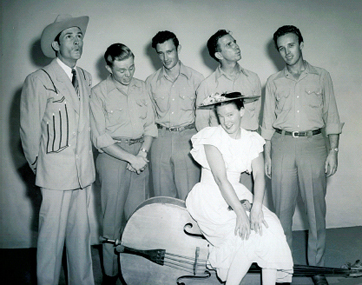The Grand Ole Opry (19 page)
Read The Grand Ole Opry Online
Authors: Colin Escott

After Eddy left Pee Wee King, Judge Hay dubbed him “The Tennessee Plowboy.” Success came quickly. Little Roy Wiggins, Eddy’s
steel guitarist: “We’d leave Nashville on Sunday night. We’d get home during the day on Saturday, play the Opry Saturday night,
and leave again Sunday night.”
IRVING WAUGH:
I told Purina that if they ever put the Eddy Arnold show in this market, it had to go on WSM because we were
the
country station. I told him that if he went to another station on Friday night we would put a live country music show against
him, in front of him, and behind him. I said, “I hate to say this because it sounds as though I’m threatening you, but this
means so much to our company.” He finally said, “You can have it, but you’ll have to do what you said you’d do if the show
went on the other station. You’ll have to build a live show in front of it and behind it.”
And so, in 1948, the
Friday Night Frolics
was created as a sister show to the Saturday night Opry. With a live audience in the WSM studio, it ful-filled the commitment
to Purina, and allowed the station to offer sponsorship opportunities to advertisers waiting for a spot on the Opry itself.
The frolics would later become the
Friday Night Opry,
moving from WSM Studio C to the Ryman on September 11, 1964.
Even with Eddy Arnold gone, the Opry was still drawing top up-and-coming stars: George Morgan, Little Jimmy Dickens, Hank
Wil-liams, and Hank Snow.
GEORGE MORGAN:
One Saturday night, I was back in Barberton, Ohio. I heard Eddy Arnold say goodbye to the Opry audience. I wondered who would
be replacing Eddy, and on Monday morning I got a call from WSM asking me to audition.
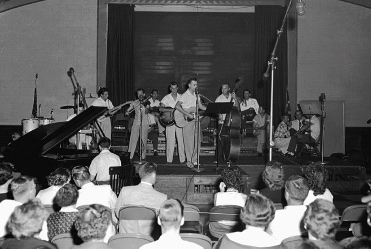
George Morgan and band perform at the
Friday Night Frolics,
broadcast from WSM Studio C. Many Opry members performed not only on the regular Saturday night show, but on daily programs
and the
Frolics
as well.
Unusually, George Morgan was brought to the Opry before he’d made his first record. He was appearing regularly on the WWVA
Jamboree, and the Opry had heard enough good reports to entice him to Nashville. Co-lumbia Records signed him as soon as he
arrived, and his first record, “Candy Kisses,” became his signature hit. In 1972, he introduced his daughter, Lorrie, a future
member, from the Opry stage.
Compensating for his small stature (four feet, eleven inches in cowboy boots) with a brassy personality, Little Jimmy Dickens
has been an entertainer more than a singer, but for many years he recruited some of the most innovative musicians in Nashville
and could perform ballads as adeptly as the novelty songs for which he’s best known.
GRANT TURNER:
Roy Acuff did a radio show from his den on Sunday afternoons. It was the first time anyone had done this on WSM. His wife,
Mildred, built a fire during the winter. Roy had met Jimmy in Saginaw, and he told Jimmy that if he came to Nashville, he’d
get him on the Grand Ole Opry, but the first time Jimmy was on WSM was on Roy’s program from his den.
LITTLE JIMMY DICKENS:
When Roy Acuff came to Saginaw [Michigan], it was very cold. He asked me, “What are you doing in this cold country?” I said,
“Well, it’s a living, you know. I’m working.” He said, “We’ve got to see about getting you out of here. Would you be interested
in coming to the Opry?” I said, “If you told me I was going to the Opry, I don’t know if I’d live long enough to make it.”
I didn’t sleep for two days and nights. [After the first show], I went back to Saginaw and forgot about it. Then I got a call
to do another guest spot. Mr. Acuff said, “You’d better bring enough things with you. I think you’re going to stay.” Sure
enough, he said, “I want you to stay around here, do my program, and stay at the house until we can get you straightened out.”
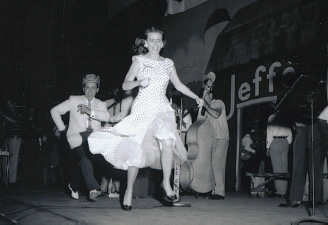
Little Jimmy Dickens in hot pursuit of June Carter on the Jefferson Island Salt portion of the Opry.
I just went from doing Mister Acuff’s programs to my own. I did early-morning programs on WSM for a pretty long period of
months, so I figured by doing that they were going to put me on the Opry as a regular member. I more or less just slid into
it.
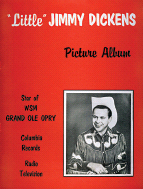
Little Jimmy Dickens songbook, published 1956.
Little Jimmy was also signed to the Opry without any hits or even a recording contract, but he, too, was acquired by Columbia
Records and used the exposure afforded by the Opry to make his first records, “Take an Old Cold Tater (and Wait)” and “Country
Boy,” into big hits.
There were years between 1957 and 1975 when Little Jimmy Dickens only guested on the Opry, but at the dawn of the new millennium,
he was the only performer who’d joined the show in the 1940s still on the bill.
Early in 1949, Hank was in Shreve-port working on the
Louisiana Hayride.
He’d been recording with intermittent success since 1946, but his record of “Lovesick Blues” had just knocked George Morgan’s
“Candy Kisses” from the top of the country charts when he was invited to Nashville. Though they didn’t realize it at the time,
Hank had already made his Opry debut.
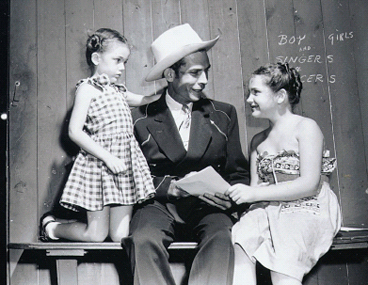
Hank Williams greets some young fans backstage.
JUDGE HAY:
We were putting on a show at Montgomery City Auditorium. This would have been the late 1930s. A boy about fifteen came rushing
up. He said, “Judge, just let me do one number, please.” I said, “You walk around backstage and I’ll listen to you.” The show
was going on, and I listened to him, and he did real well. I said, “Get up there and do a couple of songs.” Found out later,
that was Hank Williams, and it had to be ten years or more before he joined the Opry.
Hank’s reputation preceded him, but the Opry finally decided that he was a risk they had to take on.
OSCAR DAVIS,
Hank’s manager:
I came to Jim Denny, and Jim said, “No we won’t have Hank Williams. We talked about him with Harry Stone and he’s got a bad
reputation with drinking and missing shows.” So I plead and plead with him, and finally he agrees to square it away.
In order to get Hank on the Opry, his producer and music publisher, Fred Rose, gave the composer credit on a song that he
[Rose] had written to Harry Stone and Jack Stapp. That song, “Chattanoogie Shoe Shine Boy,” became a big hit for Red Foley,
Frank Sinatra, and others in 1949.
GRANT TURNER:
Hank brought that song “Lovesick Blues” to the Opry They brought him in that first night and put him in boss’s office so he
could relax, and when it came his time, they brought him down, and Red Foley introduced him. People loved that “Lovesick Blues”
song so much, they kicked up the dust in the auditorium. The spotlights looked like they were picking up smoke, there was
so much dust kicked up.
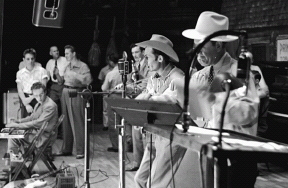
Red Foley (partly obscured with fedora hat) introduces Hank Williams on the Prince Albert Opry. Red Foley: “Well, sir, tonight’s
big-name guest is making his first appearance on Prince Albert Grand Ole Opry. He’s a Montgomery, Alabama, boy. Been pickin’
and singin’ about twelve years, but it’s been about the last year he’s really come into his own, and we’re proud to give a
rousing Prince Albert welcome to the Lovesick Blues Boy, Hank Williams. Well, sir, we hope you’ll be here for a good long
time, buddy.”
Hank Williams: “Well, Red, it looks like I’ll be doing just that, and I’ll be looking forward to it.”
LITTLE JIMMY DICKENS:
The mystery of Hank Williams I have never been able to figure out: what the magnetism was that he had. Anytime you worked
a concert with him, you didn’t have to peep around the curtain to see if you had a full house. You knew it. He’d tell you,
too. “I drew a full house, now go out there and entertain ’em.” When he came onstage people would become unglued. The lyrics
that would come out of his mouth. Unbelievable! He wasn’t that well educated. Where did all this come from? It would scare
you.
